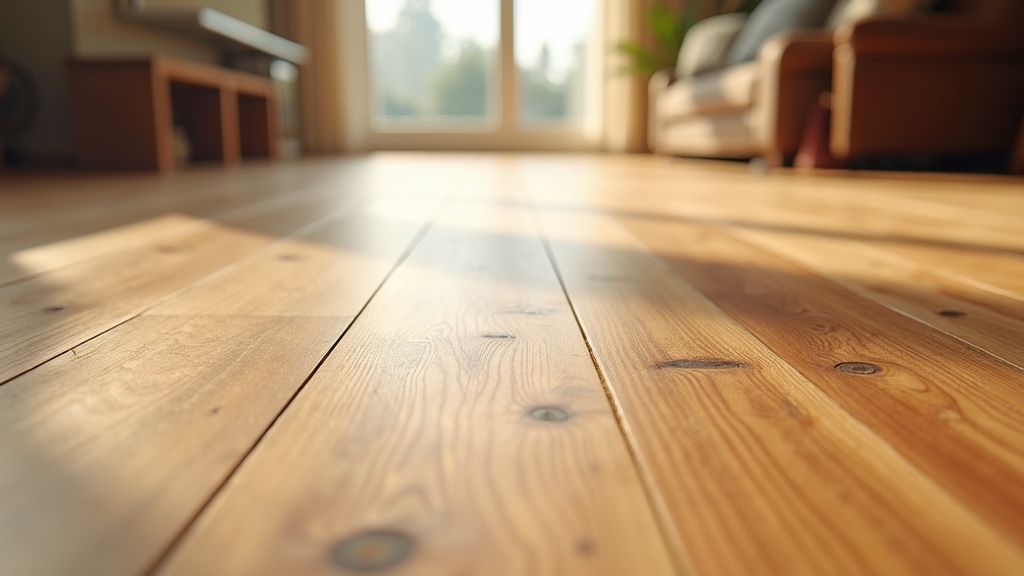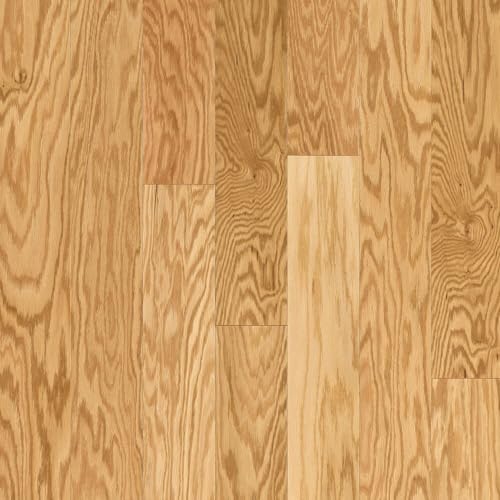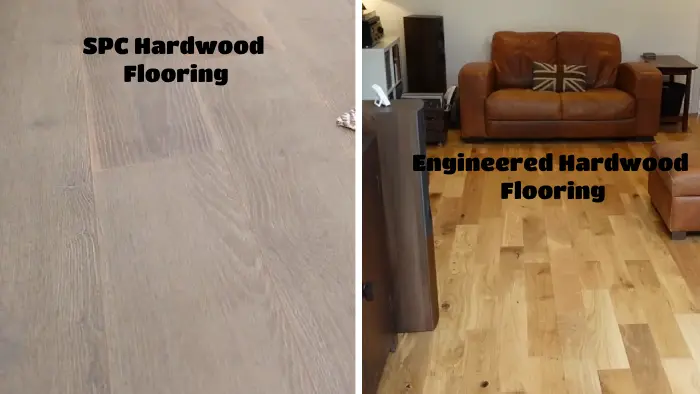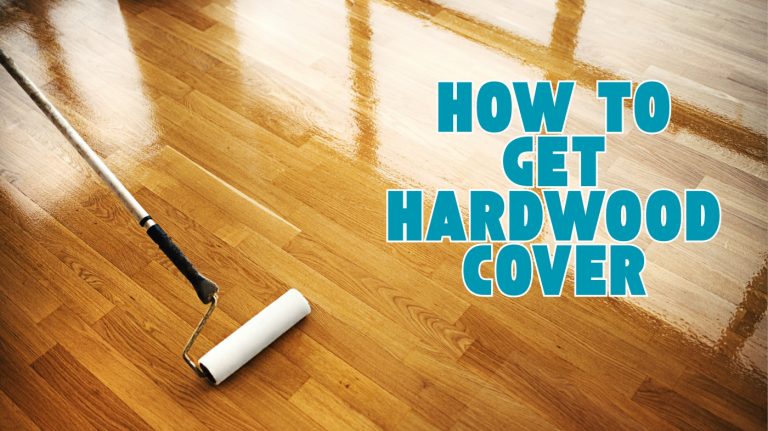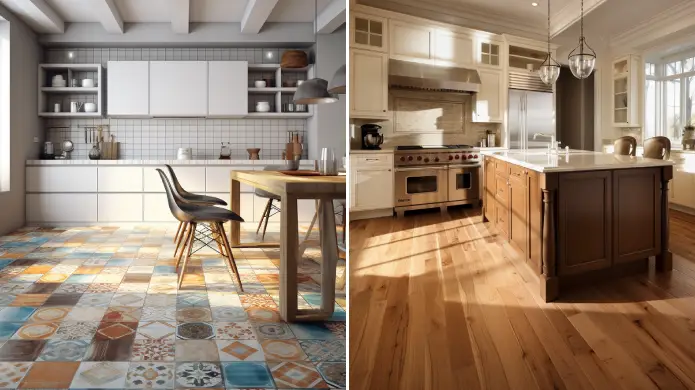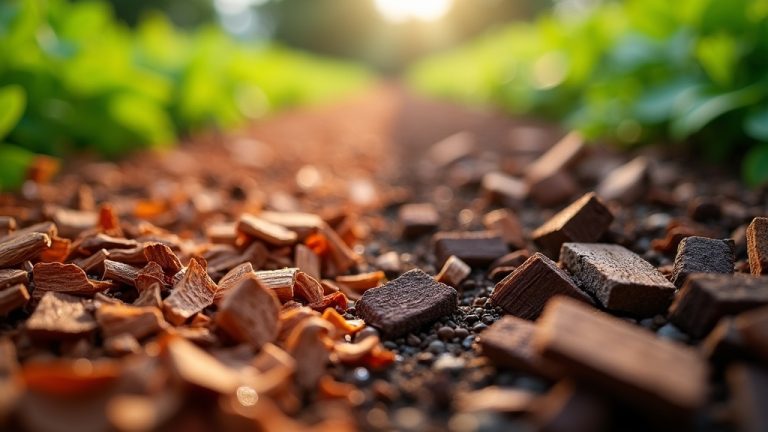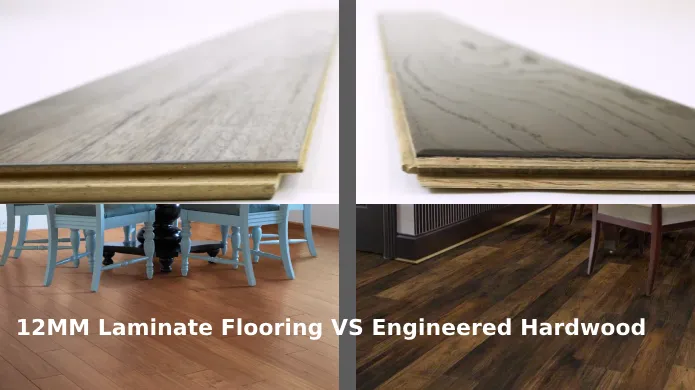Hardwood Floor vs Vinyl: Complete Flooring Comparison
When choosing between hardwood and vinyl floors, consider your style and lifestyle. Hardwood offers timeless elegance with natural grain and warmth, lasting generations if maintained well.
Vinyl brings versatile designs and excellent moisture resistance, perfect for busy or humid spaces, and is budget-friendly. Hardwood lets you refinish for renewed beauty, while vinyl provides scratch resistance and simpler upkeep.
Both have unique environmental footprints and costs. Exploring these details will help you find the perfect match for your home’s look and function.
- Planks click together easily, no glue or nails needed.
- Add value to your home with the beauty and authentic character of engineered flooring
- Suitable for on, above, or above grade installation; a perfect option for any level of your home
- Stylish – Authentic wood looking and grain texture, adding timeless feature for your home
- Easy DIY – Just peel and stick down on a flat floor for installation, no power tools, no experience,…
- Superior Property – Rigid surface and hard core, 100% waterproof, fire proof, wear resistant,…
Key Takeaways
- Hardwood floors offer timeless natural beauty and can be refinished to last over a century, while vinyl provides versatile designs and easier maintenance.
- Vinyl flooring is 100% waterproof and ideal for moisture-prone areas; hardwood is susceptible to moisture damage and requires controlled environments.
- Installation and material costs for vinyl are generally lower than hardwood, making vinyl more budget-friendly with varied price options.
- Hardwood is more environmentally sustainable, storing carbon and reducing waste through refinishing; vinyl relies on petroleum and has a shorter lifespan.
- Vinyl flooring offers excellent scratch resistance and simple cleaning, whereas hardwood demands regular sealing and skilled refinishing for upkeep.
Hardwood vs Vinyl Flooring: Side-by-Side Comparison
| Feature | Hardwood Flooring | Vinyl Flooring |
|---|---|---|
| Cost per sq ft | $9-$20 (installed) | $4-$12 (installed) |
| Lifespan | 100+ years with refinishing | 15-25 years |
| Water Resistance | Poor to moderate | 100% waterproof |
| Maintenance | Regular refinishing needed | Minimal upkeep |
| Comfort Underfoot | Firm, classic feel | Soft, cushioned |
| Noise Level | Echoes without underlayment | Naturally quiet |
| Environmental Impact | Sustainable, biodegradable | Petroleum-based, higher VOCs |
| Appearance Options | Natural wood grain variations | Wide variety of designs |
| Refinishing | Multiple times possible | Full plank replacement only |
| Best Locations | Living rooms, bedrooms | Kitchens, bathrooms, basements |
| Installation | Professional recommended | DIY-friendly floating planks |
| Resale Value | High long-term value | Moderate value retention |
Durability and Maintenance Considerations
Although both hardwood and vinyl flooring bring distinct beauty to your space, their durability and maintenance demands differ markedly. These differences shape how they age and perform over time.
Hardwood floors can last over a century with proper care, thanks to their ability to be refinished multiple times. This longevity makes hardwood a long-term investment for many homeowners. Proper installation often involves matching tile height to hardwood for seamless flooring transitions that preserve the floor’s integrity.
Hardwood endures for generations with refinishing, while vinyl resists scratches but needs full plank replacement if damaged.
Vinyl, meanwhile, offers excellent scratch resistance and requires minimal upkeep. However, damaged vinyl planks must be replaced entirely. Consider these key points to match durability with your lifestyle:
- Hardwood resists heavy traffic but shows scratches and dents more easily.
- Vinyl’s protective layer handles pets and kids with less visible wear.
- Hardwood demands regular sealing and skilled refinishing for upkeep.
- Vinyl needs simple cleaning without harsh chemicals, ideal for low-maintenance spaces.
Water and Moisture Resistance Features
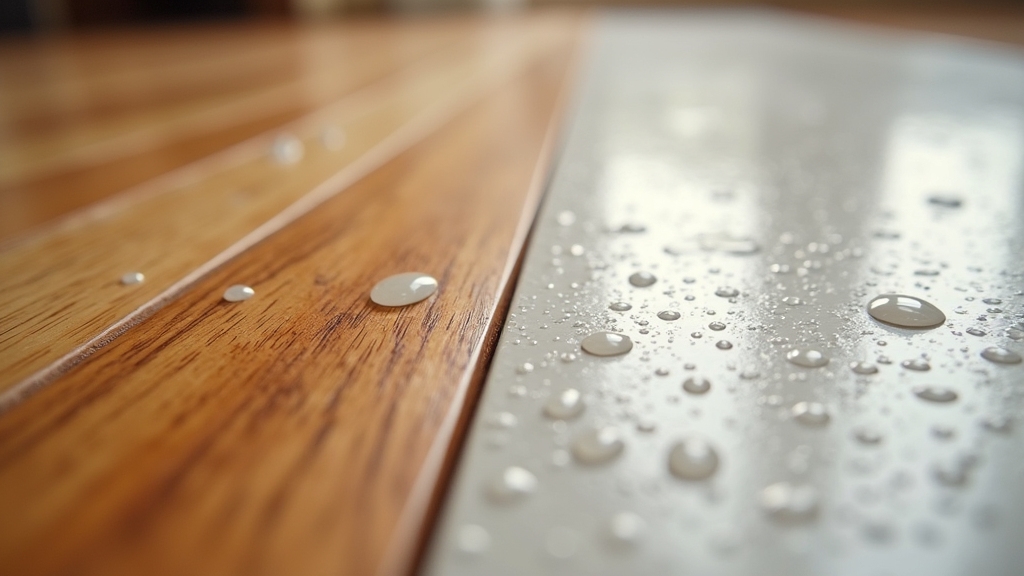
Since water and moisture can quickly undermine your flooring’s beauty and longevity, understanding how hardwood and vinyl respond to these elements is essential.
Vinyl flooring, especially luxury vinyl plank (LVP), is 100% waterproof, making it perfect for kitchens, bathrooms, and basements. Its tight click-lock installation and moisture-resistant backing prevent mold and mildew, letting you clean spills with wet mops confidently. Additionally, LVP’s ability to be cleaned with a wet mop without warping or buckling highlights its waterproof and easy maintenance qualities.
Engineered hardwood offers some water resistance, enhanced by innovative technologies like HydroBlok™, but it’s not fully waterproof—prolonged exposure risks warping or swelling. Its multi-ply Baltic birch core also provides water and mold resistance, making it more suitable for humid environments than solid hardwood.
Solid hardwood fares worse, absorbing moisture and reacting poorly to humidity. While waterproof engineered options exist, they still demand controlled environments and careful subfloor moisture testing.
Vinyl’s superior moisture resilience makes it the trend-forward choice for moisture-prone spaces, balancing beauty with practical durability.
Aesthetic and Design Choices
While moisture resistance shapes where you can confidently install your flooring, the look and feel of your floors define the soul of your space. Hardwood offers authentic wood grain and warmth, creating timeless elegance that elevates any room. Its natural fibers are susceptible to compression under pressure, which is important to consider in high-traffic areas.
Vinyl, especially luxury vinyl plank, mimics natural materials with a wider palette and bold designs, perfect for trend-savvy, versatile interiors. Its waterproof options make it especially suitable for moisture-prone rooms like kitchens and bathrooms.
Consider these design distinctions: hardwood’s unique planks and finishes provide depth, texture, and natural warmth underfoot. Vinyl delivers extensive colors, patterns, and embossed textures, offering creative freedom.
- Hardwood can be refinished to evolve with your style, enhancing long-term value.
- Vinyl’s smoother surface is easier to maintain but lacks hardwood’s organic authenticity.
Choose based on your aesthetic priorities and lifestyle needs for a truly personal space.
Environmental Impact and Sustainability Factors
When you choose flooring, you’re not just selecting a style—you’re making a statement about your environmental values. Hardwood floors, sourced sustainably and certified by FSC or SFI, embody natural beauty with a lower carbon footprint thanks to trees’ carbon absorption.
Additionally, wood stores carbon during its lifespan, aiding climate change mitigation by keeping carbon out of the atmosphere carbon storage. Their longevity and refinishing potential reduce waste, while biodegradable wood minimizes landfill impact. Hardwood also offers long-term durability which contributes to less frequent replacements and waste.
In contrast, vinyl flooring relies on non-renewable petroleum, demands energy-intensive manufacturing, and emits VOCs that affect indoor air quality. Vinyl’s shorter lifespan means more frequent replacements, adding to persistent plastic waste.
Hardwood’s natural durability, local sourcing options, and minimal chemical maintenance align with eco-conscious living. This makes hardwood a trend-forward choice that balances elegance with sustainability in your space.
Frequently Asked Questions
Which Flooring Is Better for Allergy Sufferers, Hardwood or Vinyl?
You’ll find vinyl flooring slightly better for allergies thanks to its seamless, moisture-resistant surface that keeps allergens at bay and simplifies cleaning.
While hardwood offers natural beauty and low VOCs, it can develop cracks trapping dust over time. Vinyl’s smooth finish resists mold and mildew, minimizing triggers.
Both floors elevate your space’s aesthetic and air quality, but vinyl’s effortless maintenance gives you an edge in allergy control and modern living.
How Do Hardwood and Vinyl Flooring Affect Indoor Air Quality?
Think of your indoor air as a delicate canvas—hardwood floors, finished with low-VOC sealants, keep it pristine, releasing minimal off-gassing and resisting mold.
Vinyl floors, often like bold brushstrokes, can emit more VOCs, introducing chemical aromas that linger and sometimes irritate.
While both repel allergens, vinyl’s surface might trap stubborn residues, challenging your cleaning finesse. Choosing wisely shapes an indoor atmosphere that’s both fresh and health-conscious.
Can Vinyl Flooring Be Installed Over Existing Hardwood Floors?
Yes, you can install vinyl flooring over existing hardwood floors, but you’ll want to make sure your hardwood is smooth, flat, and securely fastened. Opt for floating vinyl planks for a sleek, hassle-free look that clicks together effortlessly.
Adding an acoustic underlayment can soften sound and boost comfort. This approach preserves your hardwood’s beauty beneath, offering a stylish, moisture-resistant upgrade without the mess of removal.
What Are the Soundproofing Differences Between Hardwood and Vinyl?
You’ll notice vinyl naturally cushions footsteps and mutes impact noise thanks to its soft, pliable surface, creating a cozy, quiet vibe.
Hardwood, while stunning, reflects sound and amplifies echoes unless paired with quality underlayment like cork or rubber mats. To keep your space serene yet stylish, add acoustic treatments beneath hardwood.
Vinyl offers quieter comfort straight away, but hardwood lets you balance elegance with tailored soundproofing solutions.
How Do Hardwood and Vinyl Flooring Compare in Terms of Comfort Underfoot?
Imagine standing on a soft cloud versus a wooden deck. Vinyl feels like that cloud, cushioned and gentle, easing your feet during long hours in the kitchen.
Hardwood, though elegant and timeless, offers a firmer, less forgiving surface that might tire you faster. If warmth, softness, and reduced foot fatigue matter, vinyl’s your go-to.
But if you crave natural texture and classic charm, hardwood’s sturdy feel holds its own.
Hardwood or Vinyl: Start Planning Your Floor Project
When choosing between hardwood and vinyl, picture Sarah, who transformed her bustling kitchen with vinyl’s water resistance and easy upkeep, while her living room boasts timeless hardwood elegance.
You’ll find vinyl suits active, moisture-prone spaces, saving you money and effort, while hardwood offers unmatched beauty and lasting value in drier areas.
By blending these materials thoughtfully, you can create a stylish, practical home that keeps pace with your lifestyle and design dreams.
- One case covers 19.69 square feet.
- Premium quality real hardwood with hand-scraped and wire-brushed surface and eased ends and edges.
- For residential use, planks feature a 9-ply balanced engineered construction for superior strength.
- Effortless Installation: Upgrade your space in minutes with our peel and stick vinyl flooring—no…
- Waterproof Durability: Our waterproof vinyl flooring is designed to withstand spills, moisture, and…
- Easy to Clean Surface: Maintain a pristine look effortlessly. The smooth, stain-resistant surface of…
Last update on 2026-02-23 / Affiliate links / Images from Amazon Product Advertising API

